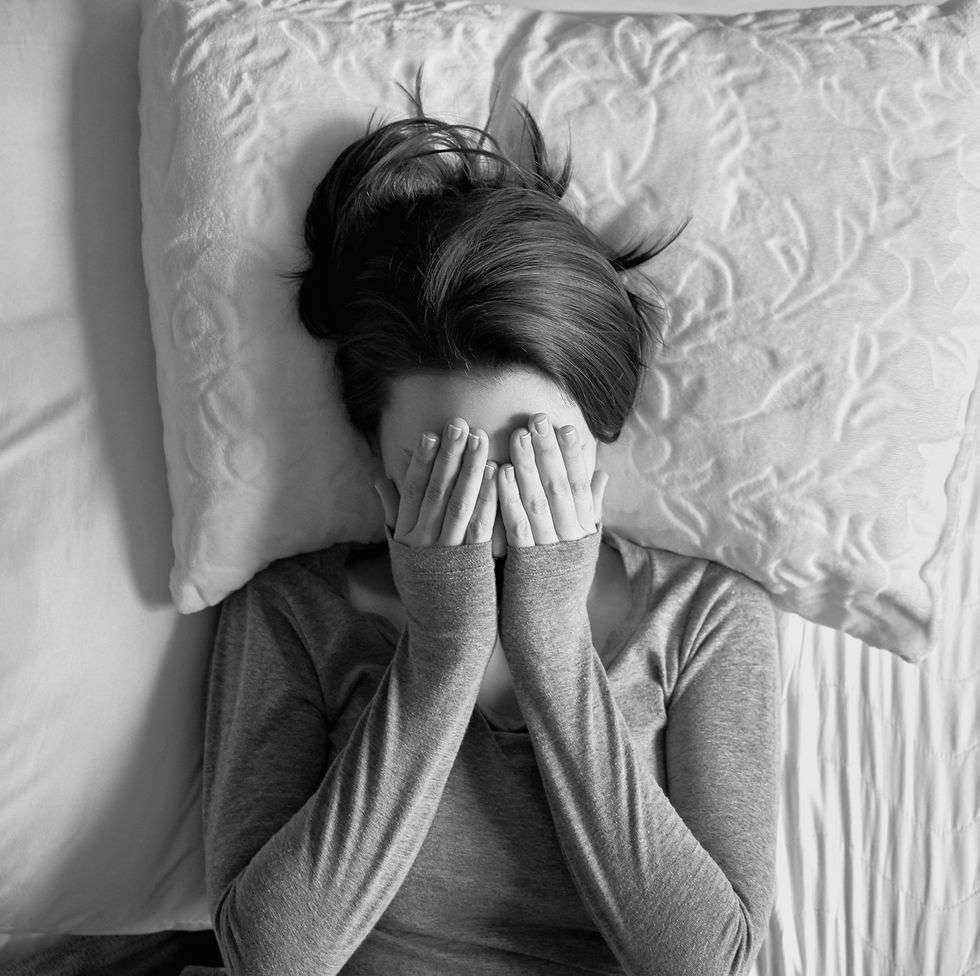Do you have trouble sleeping at night? Do you find yourself tossing and turning, unable to get comfortable? If so, you’re not alone. Millions of people around the world suffer from insomnia and other sleep-related issues. Fortunately, there are a few things that you can do to calm your anxiety and help yourself get a good night’s sleep. In this blog post, we will discuss some of the most effective tips for overcoming anxiety at night.
Contents
- 1 What Is Anxiety At Night?
- 2 Symptoms of Anxiety At Night
- 3 Causes Of Sleep Anxiety
- 4 Diagnosis of Anxiety At Night
- 5 Treatment For Anxiety At Night
- 6 How To Calm Anxiety At Night?
- 6.1 Maintaining Good Sleep Hygiene
- 6.2 Maintaining Good Sleep Cycle
- 6.3 Creating a Relaxing bedtime routine
- 6.4 Limiting caffeine and alcohol consumption
- 6.5 Eating healthy diet
- 6.6 Avoiding caffeine and alcohol before bed
- 6.7 Exercising regularly
- 6.8 Avoiding screens before bed
- 6.9 Practicing Meditation
- 6.10 Practicing Progressive Muscle Relaxation
- 6.11 Relaxing Activities
- 6.12 Avoiding Stressful Activities Before Bed
- 6.13 Writing Down Your Worries
- 6.14 Limiting Screen-time
- 6.15 Avoiding Lying In Bed When Awake
- 6.16 Setting Environment
- 6.17 Sleeping On Bed That Fits You
- 6.18 Using Sleep Mask
- 7 Conclusion
- 8 A Word From Therapy Mantra
What Is Anxiety At Night?
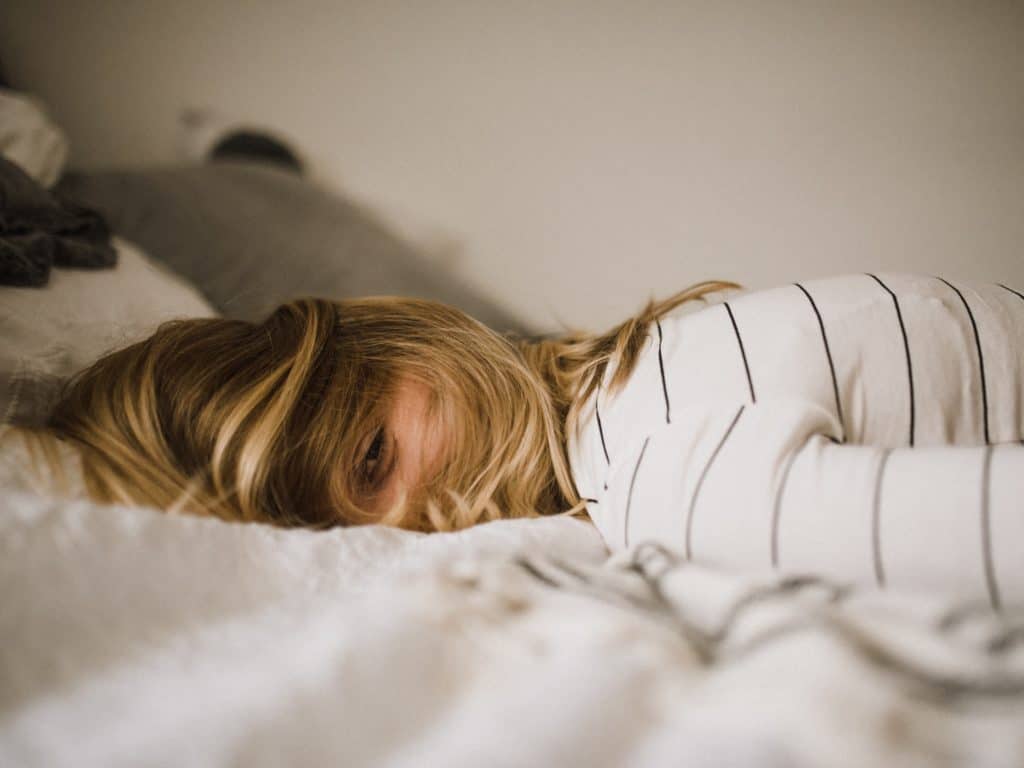 Sleep anxiety is a type of performance anxiety. It can cause you to feel stressed and anxious about sleeping. Performance anxiety is a common problem that can affect anyone, regardless of age or experience. However, it is more common in people who have other anxiety disorders like Generalized Anxiety Disorder, Social anxiety disorder, Compulsive-Obsessive disorder, and Post-traumatic stress disorder.
Sleep anxiety is a type of performance anxiety. It can cause you to feel stressed and anxious about sleeping. Performance anxiety is a common problem that can affect anyone, regardless of age or experience. However, it is more common in people who have other anxiety disorders like Generalized Anxiety Disorder, Social anxiety disorder, Compulsive-Obsessive disorder, and Post-traumatic stress disorder.
Symptoms of Anxiety At Night
The symptoms of nighttime anxiety can vary from person to person. However, some of the most common symptoms include:
Trouble Falling Asleep
If you find it difficult to fall asleep at night, you may have sleep anxiety. This is usually characterized by restless tossing and turning, as well as an inability to relax.
Waking Up In The Middle of the Night
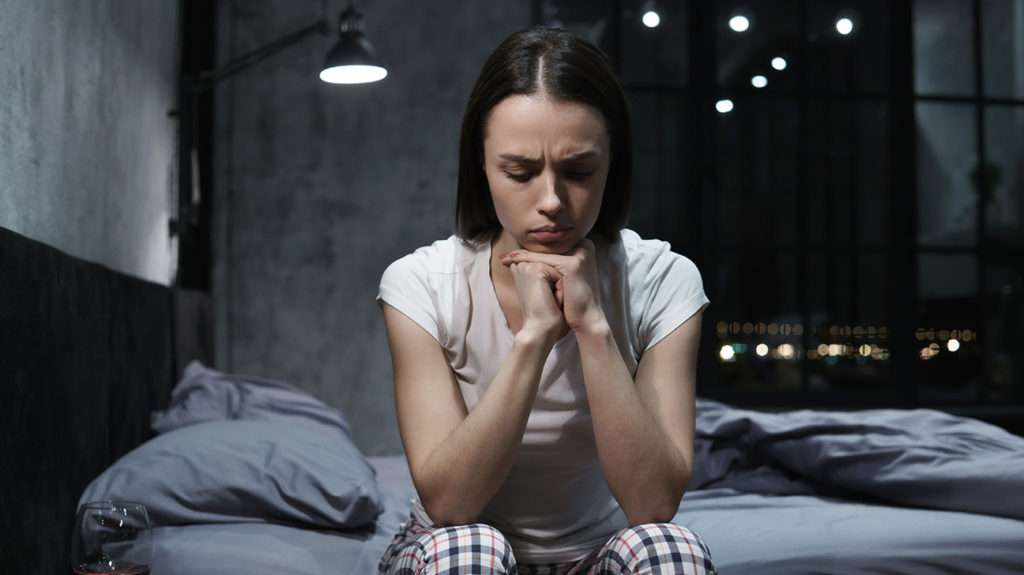
If you often wake up in the middle of the night, it may be a sign that you’re suffering from sleep anxiety. This can be caused by a restless tossing and turning, as well as worrying about not being able to fall back asleep.
Excessive Daytime Napping
If you find yourself taking excessive daytime naps, it may be because you’re not getting enough sleep at night. This can be a sign that your body is trying to make up for the lack of sleep that you’re getting.
Tiredness and Fatigue

If you’re feeling tired all the time, likely, you’re not getting enough sleep. This can hurt your work, relationships, and social life.
Causes Of Sleep Anxiety
Many different things can cause sleep anxiety. These are:
Too Much Focus In Day
One of the most common causes of sleep anxiety is focusing too much on the day’s events. If you’re constantly thinking about everything that you have to do tomorrow, it can be difficult to relax and fall asleep. Instead, try to focus on positive things that have happened during the day. For example, you could think about the compliments that you received or the progress that you made on a project.
Worrying About Future
Many people find it difficult to sleep at night because they are worried about the future. They may be concerned about things like their career, relationships, or financial security. These concerns can cause sleep anxiety and prevent us from getting the rest that we need.
Rapid Thought Patterns
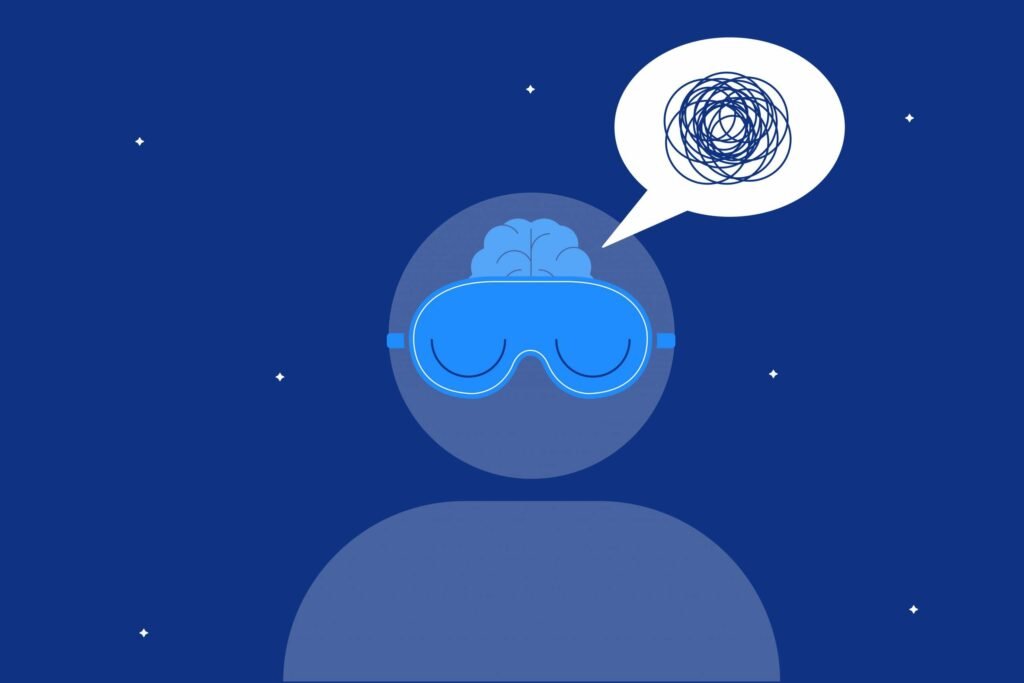
If you tend to think rapidly, it can be difficult to calm your mind and fall asleep. When our minds are racing, we tend to feel anxious and stressed. Therefore, an ideal way to counter sleep anxiety is by slowing down your fast mind.
Fear of Dark
Some people find it difficult to sleep at night because they are afraid of the dark. This is a common phobia known as Nyctophobia. If you suffer from this, try to use a nightlight or keep your bedroom door open to calm anxiety at night.
Stressful Life Events
Life can be very stressful, and sometimes it’s difficult to switch off our brains at night. Stressful life events like moving, getting married, or having a baby can cause us to suffer from anxiety at night.
Poor Sleep Cycle
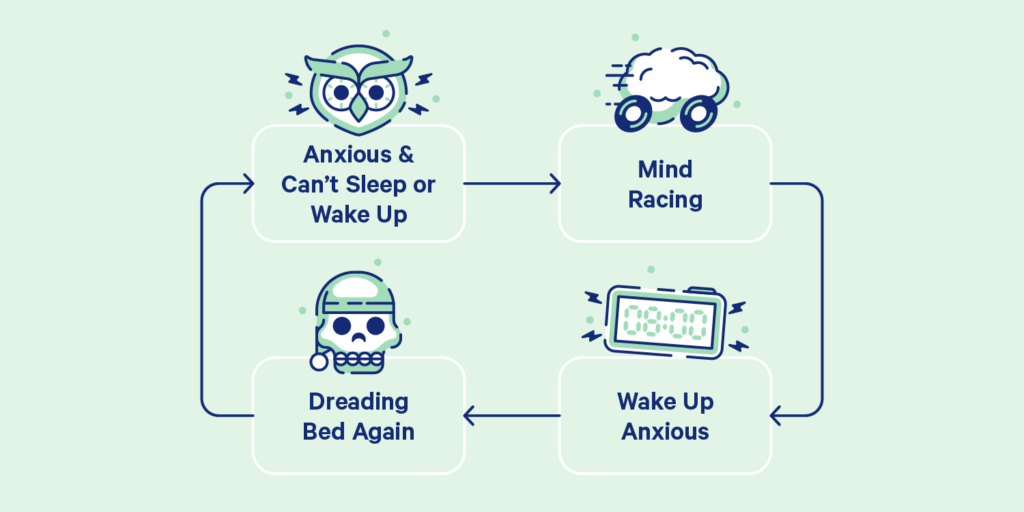
If you’re not getting enough sleep during the week, it can be difficult to relax and fall asleep on weekends. This is because your body has developed a bad sleeping pattern.
Diagnosis of Anxiety At Night
The doctor will first conduct a sleep study to find out if you have a sleep disorder. In this step, you are required to stay overnight in a sleep lab. Your healthcare provider examines how your body works while in sleep by checking your blood oxygen levels, your body positioning, breathing, electrical activity in your brain, eye movements, heart rates, and rhythm, leg movements, sleep stages, and snoring.
Treatment For Anxiety At Night
There are many medications that can treat anxiety at night. :
- Antidepressants: Some antidepressant drugs, such as Trazodone, are very good at treating sleeplessness.
- Benzodiazepines: These older sleeping pills — temazepam, triazolam, and others — may be useful when you want an insomnia medication that stays in the system longer. For instance, they have been effectively used to treat problems like sleepwalking. But these medicines have some serious downsides. They can cause addiction and dependence. Dependence means that you have physical withdrawal when you stop them.
- Doxepin (Silenor): This sleep drug is approved for use in people who have trouble staying asleep. They do so by blocking histamine receptors.
- Eszopiclone (Lunesta): Lunesta also helps you fall asleep quickly. People sleep an average of 7 to 8 hours after taking Lunesta. You should not take Lunesta unless you can get a full night’s sleep as it could cause grogginess.
- Lemborexant (Dayvigo): This drug is approved for people who have trouble falling asleep and staying asleep. It works by suppressing the part of the central nervous system that keeps you awake. It may cause you to feel sleepy the next day.
- Ramelteon(Rozerem): This sleep medication works differently than the others. It works by targeting the sleep-wake cycle, not by depressing the CNS. It is prescribed for people who have trouble falling asleep.
- Suvorexant (Belsomra): It works by blocking a hormone that promotes wakefulness and causes insomnia. The drug may cause you to feel sleepy the following day.
- Zaleplon(Sonata): Of all the newer sleeping pills, Sonata stays active in the body for the shortest amount of time. That means you can try to fall asleep on your own. If you’re still not able to sleep by 2 at night, you can take it without feeling drowsy in the morning.
- Other sleep aids: These are mostly antihistamines. They’re safe enough to be sold without a prescription. But if you’re taking other drugs that also contain antihistamines( like allergy medicines), you are inadvertently taking too much.
How To Calm Anxiety At Night?
Beating anxiety at night requires practicing a series of steps all through the day so that stress doesn’t get the better of you during the night. This may require some daytime journaling, some exercise doing your task well, and before time.
Maintaining Good Sleep Hygiene
One of the best ways to calm anxiety at night is to practice good sleep hygiene. This means developing healthy habits that will help you get a good night’s sleep. Some of the most important things to do include:
Maintaining Good Sleep Cycle
Going to bed and waking up at the same time will create a sleep cycle for your body and your mind will alert your body to wake up every time it is going to be 5 am.
Creating a Relaxing bedtime routine
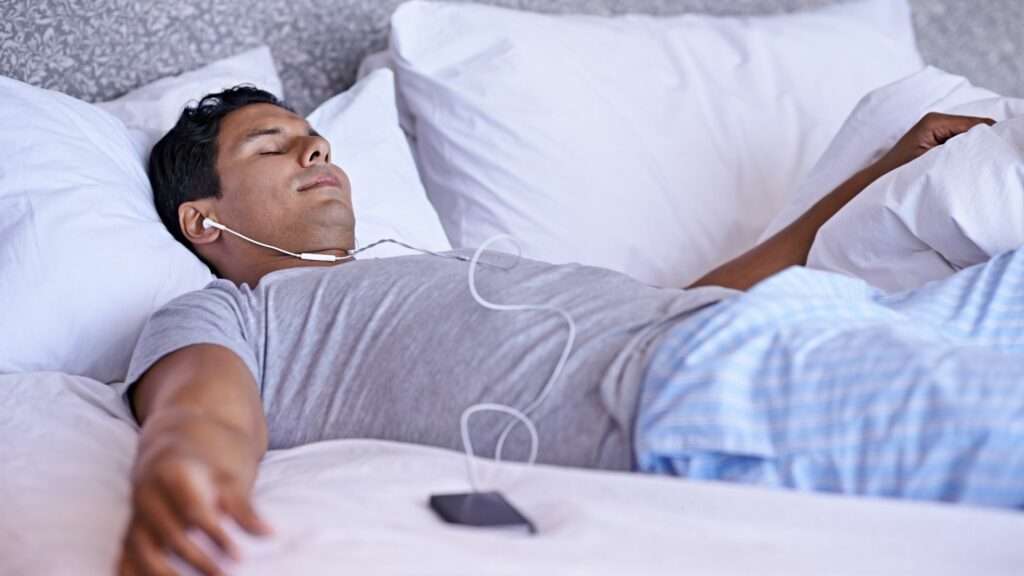
Creating a relaxing bedtime routine like writing a diary, taking a bubble bath, and arranging your school or office bag will automatically de-stress you for a good night’s sleep.
Limiting caffeine and alcohol consumption
Pumping nicotine into your body may give you the necessary stimulus during the office but it may cause you to be in a hyper-alert mode throughout the day causing you difficulty in sleeping at night.
Eating healthy diet

A healthy mind resides in a healthy body is what we have learned since childhood. Taking fruits, veggies, seeds, and nuts in your diet helps keep diseases at bay and therefore helps to reduce unnecessary anxiousness and medical bills.
Avoiding caffeine and alcohol before bed
Taking caffeine or alcohol just before bed will not only cause dehydration but will also keep you alert during the night. So, to beat anxiety at night cutting coffee and alcohol is a must.
Exercising regularly
Exercising during the daytime or for a few minutes in the afternoon generates good chemicals called endorphins that help reduce stress and help beat anxiety at night.
Avoiding screens before bed
Screen-time just before bed means that your eyes and your brain both were in alert mode before sleeping and it will take some time for your mind to relax and prepare your body for sleep. Ideally, smartphones should be switched off an hour before sleep.
Practicing Meditation
Another great way to calm anxiety at night is to practice meditation. This can help you relax your mind and body, and it may also help you fall asleep faster.
Practicing Progressive Muscle Relaxation
Progressive muscle relaxation is another technique that can be used to calm anxiety at night. This involves tightening and relaxing different muscles in your body. This can help to release tension and calm your mind.
Relaxing Activities
If you find it difficult to calm your mind at night, try setting some time apart for relaxing activities. This could include reading, listening to music, or taking a bubble bath. These activities can help you relax and de-stress before bed.
Avoiding Stressful Activities Before Bed
If you’re struggling to calm anxiety at night, try avoiding stressful activities before bed. This includes working on your computer or watching television. Exercising before bedtime should be avoided as well.
Writing Down Your Worries

If you find yourself worrying about things at night, try writing them down. This can help to clear your mind and stop you from thinking about them constantly. You can then focus on solutions for these problems during the daytime.
Limiting Screen-time

Screen-time refers to the amount of time we spend looking at screens, such as televisions, computers, and smartphones. If you’re struggling to fall asleep at night, try limiting your screen time before bed. This will help to relax your mind and body and cause lesser sleep anxiety.
Avoiding Lying In Bed When Awake
If you find yourself awake at night, try to avoid lying in bed. This can make it harder for you to fall asleep. Instead, try reading or doing another relaxing activity until you feel tired. It would be better if you leave your bed and sit on a chair or sofa.
Setting Environment
Many different things can cause sleep anxiety, but one of the most common is an unsuitable environment. If your bedroom is too bright, too noisy, or too hot, it can make it difficult to fall asleep. Try to create a calm and relaxing environment in your bedroom that will help you get a good night’s sleep.
Sleeping On Bed That Fits You
Another thing that can cause sleep anxiety is sleeping on a bed that doesn’t fit you. If your mattress is too soft or too hard, it can make it difficult to get a good night’s sleep. Try finding a mattress that is the right firm for you.
Using Sleep Mask
A sleep mask can prevent unwanted light from entering your eye. Similarly, a blanket that is a little heavier than usual may induce you into a good night’s sleep.
Conclusion
We hope that by following the tips we’ve outlined, you will be able to get a better night’s sleep and start feeling more calm and relaxed. If anxiety is keeping you up at night, don’t hesitate to reach out for help. There are many resources available to you, and with time and patience, you can overcome your anxious thoughts and finally enjoy a good night’s sleep. Do any of our readers have additional tips they use to calm their anxiety before bed? Please share in the comments below!
A Word From Therapy Mantra
Your mental health — Your psychological, emotional, and social well-being — has an impact on every aspect of your life. Positive mental health essentially allows you to effectively deal with life’s everyday challenges.
At TherapyMantra, we have a team of therapists who provide affordable online therapy to assist you with issues such as depression, anxiety, stress, workplace Issues, addiction, relationship, OCD, LGBTQ, and PTSD. You can book a free therapy or download our free Android or iOS app.
